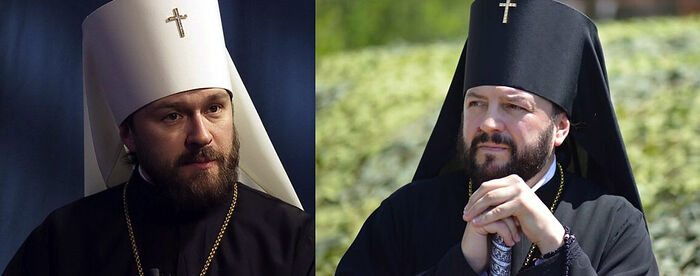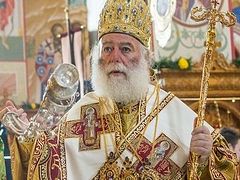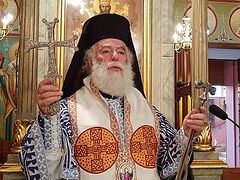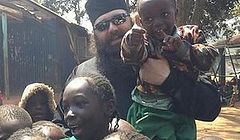Moscow, January 18, 2022
 Met. Hilarion (left), Met. Leonid (right)
Met. Hilarion (left), Met. Leonid (right)
On December 29, the Holy Synod of the Russian Orthodox Church announced the creation of an African Exarchate with two dioceses covering the whole of the African continent, and the reception of 102 African clerics into this Exarchate.
Though the Russian Church had been receiving appeals from African clergy for two years, the Synod decided to act upon them after Patriarch Theodoros of Alexandria concelebrated with Epiphany Dumenko, the head of the schismatic Ukrainian organization, in August.
The Holy Synod of the Alexandrian Patriarchate responded at its session earlier this month, characterizing the creation of the African Exarchate as “direct retaliation,” “blackmail,” and “revenge.” The Synod also stated that the Russian Church is distorting ecclesiology and evangelical love under the influence of ethnophyletism and “neo-colonialsm.”
In various interviews and statements since late December, hierarchs and clergy of the Russian Church involved in the creation of the Exarchate have explained the Russian Synod’s reasoning for establishing its presence in Africa.
A week before the Russian Synod announced its Exarchate, Vladimir Legoida, head of the Synodal Department for Church Relations with Society and the Media, explained in an interview that while the Russian Church had fully broken communion with the Patriarchate of Constantinople, the same can’t be said of the Churches of Alexandria, Greece, and Cyprus, where the primates chose to enter into communion with the schismatics without the backing of their Synods.
“That is why Eucharistic communion has been preserved with some bishops and clerics of these Churches,” Legoida explained.
In an interview with RIA-Novosti a few days after the session of the Russian Synod, Metropolitan Hilarion of Volokolamsk, head of the Russian Church’s Department for External Church Relations, explained that while the Russian Synod previously emphasized the non-conciliar character of Pat. Theodoros’ decision, no Alexandrian bishops have publicly rejected this decision in the intervening two years, unlike in Greece and Cyprus.
“We proceed from the fact that the bishops of the Patriarchate of Alexandria are in solidarity with their primate, since none of them opposed this decision, and some have even concelebrated with schismatics or have otherwise expressed support for the schism,” the DECR head explained.
Thus, motivated by the petition of more than 100 clerics, the Russian Synod resolved to create its new African Exarchate after a “thorough study of the petitions received.”
And speaking on the weekly Church and the World television program earlier this month, Met. Hilarion commented that from the Russian Church’s point of view, the creation of the Exarchate constitutes neither an invasion of Alexandrian territory nor an attempt to weaken the Alexandrian Patriarchate, but an opportunity for Orthodox believers to receive the Sacraments from canonical priests.
His Eminence again emphasized that the Moscow Patriarchate waited for two years to see how things would develop in the Alexandrian Patriarchate, during which time it several times signaled to Alexandria that it didn’t want to enter its territory. But after all the Russian Church’s proposals were rejected, and Pat. Theodoros showed by personally concelebrating with Dumenko that he had no intention of changing his position, “What was left for us to do?” the Metropolitan asks.
In his interview with RIA-Novosti, Met. Hilarion comments that after the November visit to Africa of Metropolitan Leonid, who was subsequently appointed Patriarchal Exarch in Africa, the Russian Church received several “rude letters” from Alexandrian bishops, declaring that, “Our priests don’t even know where Ukraine is.”
However, in an interview with Radio Vesti, Met. Leonid argues that such a view of the African priests is out of touch with the reality on the ground. It’s not like the internet doesn’t exist in Africa and the priests aren’t able to read about what is happening in the Orthodox world, he says. Thus, they are aware of what is happening in Ukraine and are concerned about the schism expanding into their own backyard, the Russian hierarch explained.
102 priests have already been accepted together with their flocks, while many more, possibly more than 200, are expected, Met. Leonid said. These priests have been suffering for a while now under the conditions created by the Alexandrian hierarchs, and the Russian Church won’t allow anyone to trample upon the canons, he emphasizes.
In addition to creating dioceses and possibly establishing new churches, the Russian Church will also help with humanitarian and social issues, says Met. Leonid. Many families live on but a few dollars a day; many have no access to clean drinking water, or medicine, or a decent education, “but we will bring all this into order,” the Archbishop says.
The whole Ukrainian crisis was planned by politicians who know nothing about Orthodoxy, and Pat. Theodoros recognized the schismatics under pressure from the Greek Foreign Ministry, the Patriarchal Exarch added.
On January 12, Fr. George Maximov, a Moscow priest who has traveled to Africa several times and is personally acquainted with several of the priests who have joined the Russian Exarchate, offered a report in Moscow entitled, “Orthodoxy in Africa: Problems and Perspectives.”
He pointed out that, in fact, the Russian Church presence in Africa was already restored in December 2019, when the Holy Synod resolved to convert the Russian representation church in Cairo into a parish of the Russian Church, and to withdraw the Russian churches in Africa from the jurisdiction of the Alexandrian Patriarchate. The hierarchs also decided at that time that Patriarch Kirill would no longer commemorate Pat. Theodoros in the Divine services.
Historically, the Alexandrian Patriarchate didn’t claim the whole of Africa as its territory until 1930, and the Russian Church already had several parishes throughout Africa before that, Fr. George explains. After WWII, it was agreed that the Patriarch of Alexandria would be commemorated in these churches, though that ended in 2019 after Pat. Theodoros entered into communion with the schismatics.
“Therefore, the jurisdiction of the Russian Church in Africa is already more than 100 years old,” Fr. George argued.
According to him, “the vast majority” of Alexandrian priests want to join the Russian Church.
And the reason so many want to switch jurisdictions is “the extremely unhealthy, inadequate, and erroneous arrangement of Church life, which took shape under the Greeks in the last 10-20 years,” Fr. George says.
These negative trends have intensified under Pat. Theodoros he argues, leading to many parishes and sometimes even whole deaneries leaving the Church.
There is a problem with racism among the Greek hierarchs, Fr. George states, noting that Pat. Theodoros has often talked about the Patriarchate’s task as “preserving the heritage of Hellenism.” The hierarchs, many of whom live abroad, visiting their flock but once or twice a year, use the Africans for photo ops, Fr. George says. “All this created an extremely unhealthy situation in the Orthodox Church of Alexandria and pushed many of its clerics to change their jurisdiction.”
Fr. George also recalls that many clerics of Alexandria, including several bishops, were caught by surprise by Pat. Theodoros’ decision to enter into communion with the schismatics. “They were plunged into a conflict that they didn’t want,” Fr. George says.
“The Patriarchate of Alexandria has taken the wrong path,” Fr. George said, succinctly summarizing the Russian Church’s position.
Follow us on Facebook, Twitter, Vkontakte, Telegram, WhatsApp, MeWe, and Gab!




